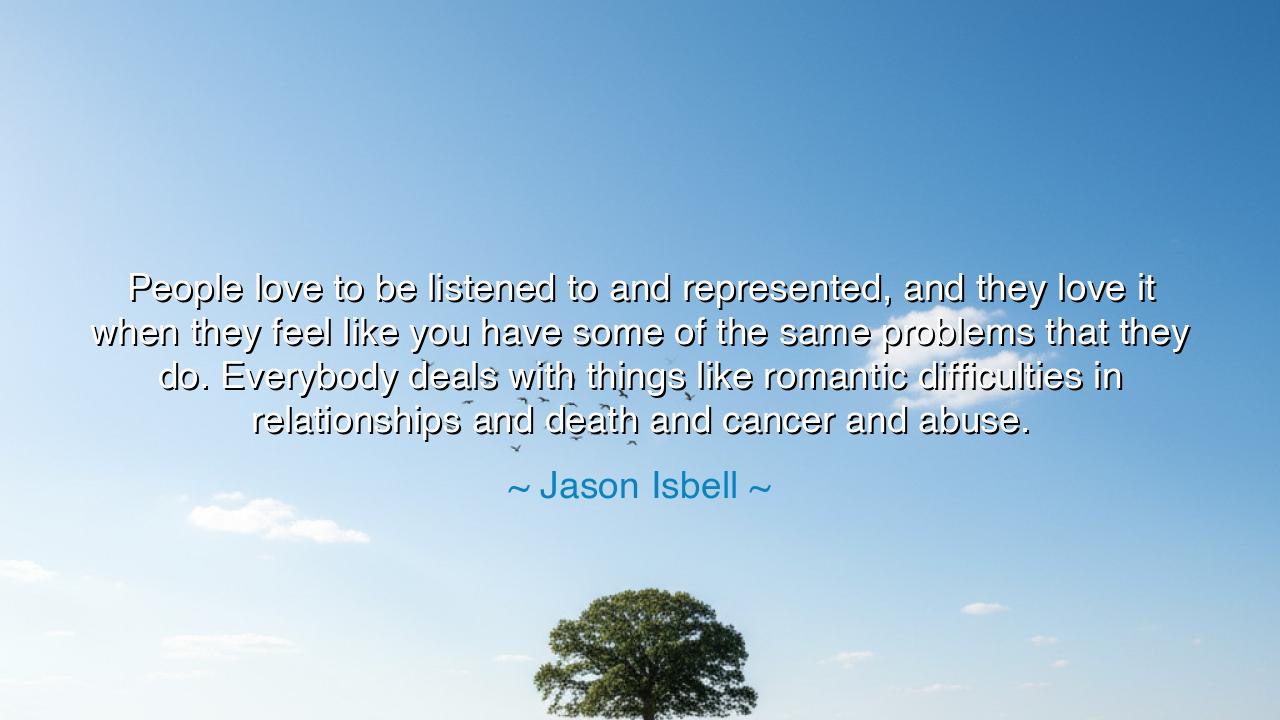
People love to be listened to and represented, and they love it
People love to be listened to and represented, and they love it when they feel like you have some of the same problems that they do. Everybody deals with things like romantic difficulties in relationships and death and cancer and abuse.






The musician and poet Jason Isbell once spoke with the wisdom of one who has lived and listened deeply: “People love to be listened to and represented, and they love it when they feel like you have some of the same problems that they do. Everybody deals with things like romantic difficulties in relationships and death and cancer and abuse.” These words carry the weight of empathy — the bridge between souls — and the understanding that connection is born not from perfection, but from shared struggle. What Isbell names here is the essence of human unity, the invisible bond that ties every heart to another through pain, loss, and longing.
From the dawn of our species, men and women have gathered around fires, beneath stars, or within temples, not merely to survive, but to be heard. To tell one’s story and to be listened to is to affirm that one’s life matters — that one’s suffering is seen, one’s joy is real, one’s voice is not swallowed by silence. The ancients knew that when people cease to listen, civilizations begin to crumble. A heart unheard becomes a heart hardened. Thus, listening is not a passive act; it is a sacred duty. To truly hear another’s pain is to share in the burden of their humanity.
Isbell reminds us that what unites all people are not their triumphs, but their wounds. Romantic difficulties, death, illness, and abuse — these are not curses upon a few, but trials common to all flesh. Even the mighty have knelt before grief. The kings of old lost those they loved; the prophets faced despair; the poets wrote by candlelight of heartbreak and the longing for meaning. The universality of suffering is what gives art its power, music its depth, and faith its purpose. When we share our pain, we do not spread weakness — we spread recognition.
Consider the story of Victor Hugo, the great French writer. Though hailed as a genius, he was not spared the sorrows of mankind. His beloved daughter Léopoldine drowned at nineteen, and in the years that followed, Hugo’s heart became a storm of mourning. Yet from that darkness was born Les Misérables, a tale of love, injustice, and redemption — a work that spoke for the broken, the poor, the forgotten. Through his own suffering, Hugo gave voice to the voiceless, and generations found in his words the comfort of being represented. This is what Isbell means — that the artist, and indeed every human soul, holds a mirror for others to see themselves and to know they are not alone.
Representation, then, is not merely political or artistic; it is spiritual. To represent another is to say: I see you. I have felt what you feel. Your story is not isolated; it belongs to all of us. When Isbell sings of heartbreak or hardship, it is not his story alone — it is the song of countless others carried in one voice. The same truth applies beyond music: in friendship, in family, in community. When one person dares to speak their truth, it gives permission for others to speak theirs. This is how humanity heals — not through pretense, but through shared truth.
The origin of Isbell’s insight lies in compassion born of hardship. As a man who faced addiction, loss, and renewal, he learned firsthand that pain shared becomes lighter. The listener is transformed alongside the speaker. To speak honestly is to offer a light in the darkness; to listen without judgment is to receive that light and pass it forward. Both acts require courage — the courage to be vulnerable, and the courage to care. The ancients would have called this communion — the sacred exchange of understanding that transcends words.
So let us draw the lesson: listen deeply, not merely with ears but with heart. When someone speaks of sorrow, resist the urge to compare or fix; instead, be the stillness that allows their truth to unfold. Represent others when they cannot speak — stand for them in compassion, in art, in justice. And when you find yourself broken, remember that your suffering does not isolate you — it joins you to the countless others who have felt the same. Out of that shared humanity, new strength arises, and from that strength, love is reborn.
For in the end, as Jason Isbell teaches, the most powerful magic is not in fame, fortune, or mastery — it is in the simple act of being human with others. To listen. To relate. To share the ache and the beauty of being alive. In doing so, we weave an invisible tapestry of empathy that stretches across generations. And when the world grows cold, that tapestry — made of countless voices and stories — becomes the warmth that saves us all.






AAdministratorAdministrator
Welcome, honored guests. Please leave a comment, we will respond soon